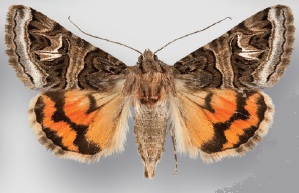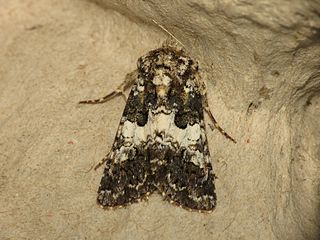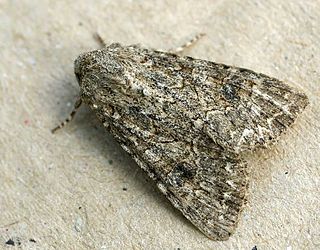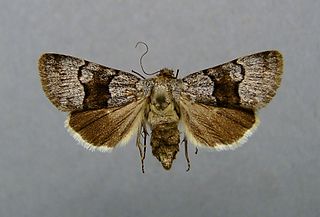| Lasionycta | |
|---|---|
| | |
| Lasionycta caesia | |
| Scientific classification | |
| Domain: | Eukaryota |
| Kingdom: | Animalia |
| Phylum: | Arthropoda |
| Class: | Insecta |
| Order: | Lepidoptera |
| Superfamily: | Noctuoidea |
| Family: | Noctuidae |
| Tribe: | Eriopygini |
| Genus: | Lasionycta Aurivillius, 1892 |
| Lasionycta | |
|---|---|
| | |
| Lasionycta caesia | |
| Scientific classification | |
| Domain: | Eukaryota |
| Kingdom: | Animalia |
| Phylum: | Arthropoda |
| Class: | Insecta |
| Order: | Lepidoptera |
| Superfamily: | Noctuoidea |
| Family: | Noctuidae |
| Tribe: | Eriopygini |
| Genus: | Lasionycta Aurivillius, 1892 |
Lasionycta arietis, Lasionycta insolens, Lasionycta ochracea, Lasionycta sala, Lasionycta wyatti have been transferred to the genus Psammopolia . [1]

Apamea is a genus of moths in the family Noctuidae first described by Ferdinand Ochsenheimer in 1816.

Agrotis is a genus of moths of the family Noctuidae. The genus was erected by Ferdinand Ochsenheimer in 1816. A number of the species of this genus are extinct.

Hadenini is a tribe of cutworm or dart moths in the family Noctuidae. There are more than 140 genera and 1,000 described species in Hadenini, found worldwide.

Cucullia is a genus of moths of the family Noctuidae. The genus was erected by Franz von Paula Schrank in 1802.

Dichagyris is a genus of moths of the family Noctuidae. The former genera Loxagrotis, Pseudorichia, Pseudorthosia and Mesembragrotis are now considered subgenera of Dichagyris. From Greek dikha-gyris 'apart, asunder; double' + 'the finest meal or flour'; English pronunciation: /digh-kuh-JIGH-riss/, IPA [dɑj•kə'dʒɑj•ɹɪs].

Drasteria is a genus of moths in the family Erebidae.

Euxoa is a genus of moths of the family Noctuidae raised to Genus by the German entomologist, Jacob Hübner. The Genus is mostly confined to dry and semi dry areas in the Northern Hemisphere. There 130 species in Eurasia, a few in Africa, and 175 in North America. There are no species in the Genus in South-East Asia or in Australia. In North America, most species are found in Western regions. Of the North American species, 4 are endemic to Mexico. There is one species recorded from Chile, but this may be a mislabeled specimen. In real terms, species numbers do not equal species abundance. Some areas with few species have large numbers of the ones that do live there.

Hadena is a genus of moths of the family Noctuidae erected by Franz von Paula Schrank in 1802. About fifteen species are native to North America, while over one-hundred are distributed in the Palearctic realm.

Hadula is a genus of moths of the family Noctuidae.

Lithophane is a genus of moths of the family Noctuidae. They spend the winter as adults. Some species are capable of feeding on other caterpillars or on sawfly larvae, which is rather uncommon among Lepidoptera.

Polia is a genus of moths of the family Noctuidae described by Ochsenheimer in 1816.

Sympistis is a genus of moths of the family Noctuidae. The genus was erected by Jacob Hübner in 1823.
Psammopolia is a genus of moths of the family Noctuidae.
Psammopolia insolens is a moth of the family Noctuidae. It occurs on Pacific Coast sand beaches in central California from Carmel to Bodega Bay, Sonoma County. Most specimens are from near San Francisco.
Psammopolia ochracea is a species of moth in the family Noctuidae. It can be found on sandy beaches in coastal California between San Francisco and Los Angeles. Adult moths are small, dark brown or reddish in colour, and active between September and October.
Tricholita knudsoni is a moth of the family Noctuidae. It is known from western Texas from Concan westward to the Chisos, Davis, and Guadalupe Mountains.
Noctuini is a tribe of owlet moths in the family Noctuidae. There are at least 520 described species in Noctuini.